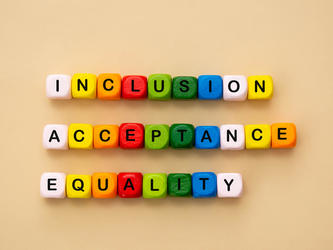Making research accessible
As it was National Coming Out Day this week, I think it’s finally time that I told you something. I enjoy musicals, I have a large collection of brooches and... I’m partially sighted.
For anyone who has seen me get within licking distance of a restaurant menu to read it or walk face first into a sign or fling myself obliviously into the path of my latest nemesis, the silent and deadly e-scooter, this revelation will probably be less surprising than when I stopped quoting Acorn Antiques for long enough to actually come out as gay back in the Bexley Grammar sixth form centre circa 1997.
I was born with a rare genetic vision impairment, which means even with glasses or contact lenses I have significantly low-vision and I’m monochromatically colour-blind. It was spotted quite early, when I used to put paint brushes back in the wrong coloured pots at nursery (though I’m not convinced I wouldn’t have done that anyway).
I was properly diagnosed at Moorfields Eye Hospital when I was about four and was statemented throughout school, where I got so much help – and, frankly, away with murder – that I never considered myself disabled, even if one of the few things I saw very clearly was that word next to my name on various official documents.
In fact, maybe even up until the start of this week, I would have hesitated to use the word disabled about myself. But since then we’ve had the Unlimited Festival – five events over five days with 25 speakers sharing their stories of living with, adapting to and behaving around disability and neuro-diversity. It has been by turns fascinating, infuriating, inspiring and emotional to watch.
One thing I’ve definitely learnt is that there’s nothing to be gained from fear of the term ‘disabled’. Some people are physically not able to do certain things – walk upstairs, read a speeding autocue, put the brush with green paint on it back in the green paint pot. That’s a disability – but acknowledging it has to stop being the end of the conversation.
If someone’s physical inability to do something excludes them, what can we do to include them? We may be born with disabilities, but as Asad Dhunna of The Unmistakables, who chaired Wednesday’s session, said: “The things that make us feel excluded are man-made... if we’re then striving to inclusion we can make it, because we’ve made the opposite.”
Medical interventions and, more importantly in many cases, technology are key to redressing the balance – in my own case, the invention of apps on a screen whose text size and colours I can customise to replace things like distant train information boards and (to me) completely illegible red-on-black numbers on the front of buses, has been life-changing.
But the research sector has a vital part to play too. It’s about recruiting disabled people to participate in your groups, even when the subject is not specifically about disability. It’s about recruiting and enabling disabled people to work in the sector so that the voice of lived experience is heard in planning, strategy and design. It’s about going to advertisers with evidence that they can be representative without being tokenistic.
It’s about acknowledging that inclusive design – of how a survey works, of how a viewing facility is accessed, of the line-up of an industry event – is essential to making sure everyone gets heard and, while it might address someone’s specific need, can also be useful to everyone.
The comment that has stuck with me most this week came from Steven Lacey of The Outsiders, who is co-chairing the new network with Hall & Partners’ Vanella Jackson. Lacey said: “a lot of energy can be spent on language, but I want to see a lot of energy spent on change.” I hope that MRS Unlimited can encourage the research sector to make those changes – for me, for you, for all of us.
John Bizzell is events and awards manager at the Market Research Society
You can now watch all the sessions from MRS Unlimited here.
Sign up to the MRS Unlimited mailing list for information about future activities here.

We hope you enjoyed this article.
Research Live is published by MRS.
The Market Research Society (MRS) exists to promote and protect the research sector, showcasing how research delivers impact for businesses and government.
Members of MRS enjoy many benefits including tailoured policy guidance, discounts on training and conferences, and access to member-only content.
For example, there's an archive of winning case studies from over a decade of MRS Awards.
Find out more about the benefits of joining MRS here.












0 Comments